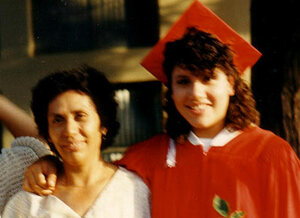Sandra Frausto

Sandra was a 21-year-old senior studying sociology at UC Santa Cruz. She was committed to learning, educating, and advancing the causes of Latinas and Chicanas in the United States and beyond. Her goal of studying in Mexico City was finally realized in 1987 through the Education Abroad Program (EAP). Sadly, her dreams were cut short when she died prematurely in Mexico City.
When they were informed that someone had made a gift to UCSC to honor Sandra, her family, including her mother, eight brothers and sisters, and friends undertook an endeavor to have an award created in her name. The family pledged a gift of $10,000 to establish the Sandra Frausto Student Award at UC Santa Cruz, in support of the Financial Aid Office in the Division of Student Affairs. They’ve already exceeded their goal, but are excited to build the fund for the future.
“When it came to addressing a commitment as big as we’d made to Sandra’s fund, my mother had all kinds of creative ideas,” Sandra’s older sister Angie Frausto recounted. “Instead of buying each other Christmas gifts, we’d donate to Sandra’s cause. My mother is a great tamale cook, so we sold those to friends. We took turns doing yard sales. We all found ways to donate $100 here or there.”
The Sandra Frausto Student Award rewards the achievements of an undergraduate UCSC student from Merrill College, as Sandra was, who has combined academic excellence with a commitment to increasing the understanding or improving the welfare of Chicanas and Latinas in the United States and beyond.
The award particularly seeks to recognize those students participating in EAP and studying in Mexico or a Latin American country, who are majoring in education, politics, Latin American and Latino studies, community studies, and other social science fields of study. Additionally, the award supports students who come from low-income families or are the first in their family to go to college.
“Our family is first generation from Mexico,” Rojo said. “Sandra believed that the key to overcoming the challenges we faced was education. She had a vision for her future in which she would educate her students about the importance of education itself in overcoming prejudice and struggle.”
Frausto expressed that “passing Sandra’s dream along to others helped us to deal with the void of her loss. We wanted to honor her and we had the will to make it happen.”